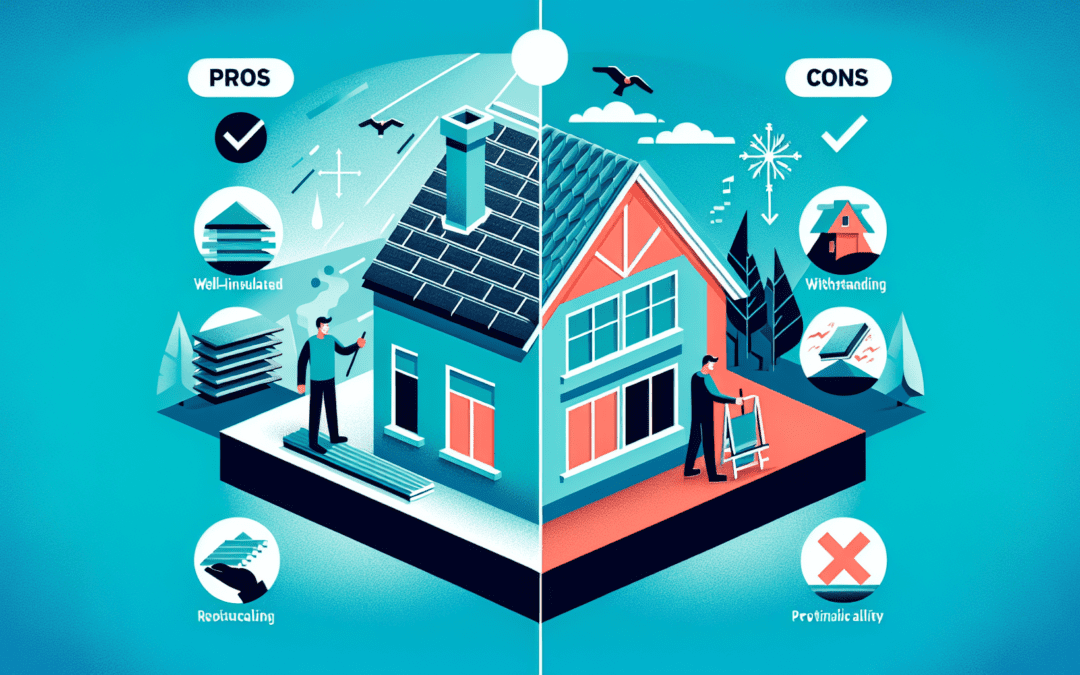
Apr 29, 2024 | Commercial, Contractors, Materials, Roofing
Finding the right people to take care of your commercial building’s roof is a big deal. It’s not just about fixing leaks or installing a new roof; it’s about making sure your building is safe, secure, and looking its best. If you’re considering rubber roofing for its durability and cost-effectiveness, you’re on the right track. But how do you choose the best commercial rubber roofing contractors? Let’s dive into some tips to help you make the best decision.
Understand Your Roofing Needs
First, it’s essential to know exactly what you need. Rubber roofing can mean a lot of different things, from full replacements to minor repairs. Think about the current state of your roof and what you hope to achieve with this project. Do you need a brand new roof, or are there specific areas that need attention? Understanding your needs will help you ask the right questions when you start talking to contractors.
Look for Experience and Expertise
When you’re looking for a contractor, experience should be at the top of your list. Contractors who have been in the business for a long time will have a track record you can check. They’ll also have a good understanding of the challenges and solutions related to rubber roofing. Ask potential contractors about their experience specifically with commercial rubber roofs. It’s also a good idea to ask for references or examples of previous projects they’ve completed.
Check Licenses, Certifications, and Insurance
Any contractor you hire should be properly licensed to work in your area. They should also have certifications that prove they are trained and skilled in working with rubber roofing materials. It’s equally important to ensure they have insurance. This protects you from being responsible if an accident happens while they are working on your property. Don’t be shy about asking to see these documents; a reputable contractor will be happy to show them to you.
Compare Quotes
Once you have a few contractors in mind, ask each one for a quote. This should be a detailed document that outlines the work they plan to do, the materials they will use, and how much it will cost. Remember, the cheapest option is not always the best option. Take the time to compare what each contractor is offering and consider their experience, the quality of materials they suggest, and the timeline for completing the project.
Communication is Key
Last but not least, pay attention to how well the contractor communicates with you. A good contractor will be easy to reach, will answer your questions clearly, and will keep you updated throughout the project. They should make you feel comfortable and confident in their abilities. After all, they will be taking care of one of the most important parts of your building. Good communication can make the difference between a stressful project and a smooth, successful one.
Choosing the best commercial rubber roofing contractor might seem like a daunting task, but with a little research and the right questions, you can find a reliable professional who will get the job done right. Remember to understand your needs, look for experience and expertise, check licenses and insurance, compare quotes, and pay attention to communication. With these tips in mind, you’ll be well on your way to having a durable, well-installed rubber roof over your head.

Apr 25, 2024 | Contractors, Maintenance, Roofing
Having a damaged roof can be really stressful. It might be from a storm, fallen tree, or something else. Whatever the reason, it’s important to know how to file a claim with your insurance company to get it fixed. Here are the steps you should follow:
Step 1: Check Your Insurance Policy
First things first, grab your insurance policy and read it carefully. You need to know what kind of roof damage your insurance covers. Not all policies cover every type of damage. Also, look for how much time you have to file a claim after the damage happens.
Step 2: Document the Damage
Next, it’s time to take lots of pictures and video of the damage. This helps show your insurance company exactly what happened. Try to get clear shots from different angles. If you have “before” pictures of your roof, that’s even better because you can show the difference.
Step 3: Temporarily Fix Your Roof
While you’re waiting for your insurance company to help, you might need to protect your house from more damage. This can mean covering holes in the roof with a tarp or something similar. But remember, keep your receipts for any money you spend, because you might be able to get that money back from your insurance.
Step 4: Contact Your Insurance Company
Now, it’s time to get in touch with your insurance company. Tell them what happened and that you want to file a claim. They’ll guide you on the next steps, which usually include filling out some paperwork and possibly meeting with an insurance adjuster.
Step 5: Meet the Insurance Adjuster
Your insurance company might send out an adjuster to look at the damage. This person checks out the roof to see how bad the damage is and decides how much money the insurance company should give you to fix it. Make sure to show the adjuster all the damage.
Step 6: Get Estimates from Contractors
While you’re waiting for the adjuster’s report, start looking for a good roofing contractor. It’s smart to get estimates from a few different ones. This way, you’ll have a good idea of how much the repair should cost. You can use these estimates when talking to your insurance company about the amount of money they’ll give you.
Step 7: Finalize the Claim and Start Repairs
After the insurance company agrees on the cost of repairs, you’ll finally get the money to fix your roof. Choose your contractor and get your roof fixed. Sometimes the insurance company might pay the contractor directly; other times, they’ll give you the money to pay the contractor.
Step 8: Keep All Your Records
Last, make sure to keep all the paperwork and receipts related to the roof repair and your insurance claim. This includes your original insurance policy, repair estimates, and any communication with your insurance company. These records can be very important if there are any questions or problems later on.
Remember, it’s really important to act quickly when your roof is damaged. Following these steps can make the process of filing a claim smoother and help you get your roof fixed as soon as possible.

Mar 21, 2024 | Contractors, Cost Guides, Roofing
When you need to get your roof fixed or replaced, you want everything to go smoothly. After picking the right roofing contractor, the next step is figuring out how to pay them. There are many ways to pay for roofing services, and each has its pros and cons. Let’s explore the top payment methods so you can find the one that’s best for you.
Cash Payments
Paying with cash is the simplest way. It’s straightforward – you hand over the money, and the job gets done. Many contractors like cash payments because they’re easy to manage. The downside is that carrying a lot of cash can be risky, and there’s no paper trail unless you get a receipt.
Checks
Checks are a traditional way to pay for services like roofing. They are safer than carrying cash and provide a record of your payment, which can be helpful for keeping track of your spending and for tax purposes. However, checks can take a few days to clear, which might delay the start of the work on your roof.
Credit Cards
Credit cards are a convenient and secure way to pay. They offer protection against fraud, and many cards come with benefits like cash back or points for purchases. Paying with a credit card can also give you a bit of extra time to pay off the bill. But, be cautious of interest charges if you don’t pay off your balance right away. Some roofing contractors might also charge a small fee for credit card payments.
Financing
If the roofing job is expensive, financing might be a good option. Some roofing companies offer financing plans, allowing you to pay for the roof over time. This can be helpful if you don’t have the full amount up front. It’s important to read the terms carefully, though, to make sure the interest rates and payment plans work for you.
Online Payments
Online payments are becoming more popular. Platforms like PayPal, Zelle, or Venmo allow you to transfer money directly from your bank account or credit card to the contractor. This method is fast and provides a digital receipt for your records. Make sure the roofing contractor accepts online payments before taking this route.
Insurance Claims
If your roof was damaged by weather or some other covered incident, your homeowner’s insurance might cover the repair or replacement. In this case, the payment might go directly from your insurance company to the roofing contractor. You’ll need to work closely with both your insurance provider and the roofing company to make sure all the necessary paperwork is completed.
Finding the right payment method for your roofing project is important. Remember to consider the safety, convenience, and any additional costs or benefits of each option. And always get a receipt no matter which payment method you choose, to keep track of your expenses and for peace of mind.

Jan 11, 2024 | Contractors, Cost Guides, Materials, Roofing
Roof replacement is a significant home improvement project that not only ensures your safety and comfort but also enhances the value and appeal of your property. Knowing the steps involved in the process can help homeowners manage their expectations, make informed decisions, and ensure a smooth and successful project execution. This detailed guide aims to navigate homeowners through each phase of roof replacement, from initial consideration to the completion of the project.
Assessment and Decision Making
The first step in the roof replacement process involves assessing the condition of your current roof. Several signs indicate the need for a new roof, including but not limited to, significant leaks, extensive damage to shingles or tiles, and an aged roof beyond repair. Consulting with a professional roofer for an inspection can provide you with an expert opinion on whether a repair might suffice or if a full replacement is necessary. These assessments typically consider the age of your roof, the extent of damage, and whether your roof can withstand future weather conditions.
Choosing the Right Roofing Material
Once the decision is made to replace the roof, the next step involves selecting the appropriate material. Homeowners have numerous options ranging from asphalt shingles, metal, tile, slate, and more, each with its pros and cons, including variability in durability, appearance, and cost. The climate of the area, your home’s architectural style, and budget are critical factors influencing the choice of roofing material.
Finding a Qualified Contractor
Finding the right contractor is critical for a successful roof replacement project. Seek out licensed, insured, and reputable professionals with ample experience in installing your chosen roofing material. Obtain multiple quotes to compare prices, but also consider the quality of work, communication skills, and reviews from previous clients. It’s important to discuss and fully understand the warranty offered on both materials and labor.
Understanding the Cost
The cost of roof replacement varies widely depending on the roofing material, the size of your roof, and the complexity of the job. Your contractor should provide a detailed quote covering the cost of materials, labor, permits, and waste disposal among other potential expenses. Unforeseen costs can arise, so it’s wise to budget for additional expenses beyond the initial estimate.
Preparing for the Project
Preparation for roof replacement begins with setting a realistic timeline with your contractor. Roof replacement can disrupt daily life, so knowing the timeframe helps manage your schedule and prepare your household. It’s prudent to secure valuables, cover belongings in the attic, and inform neighbors about the project due to potential noise and debris. Additionally, ensure the contractor discusses site preparation, including the placement of dumpsters and protection for your property.
During the Replacement
Throughout the roof replacement, your chosen contractor will remove the existing roof, make necessary repairs to the underlying structure, and install the new roofing material. This process can take several days to a week or more, depending on the size of the roof and complexity of the job. Homeowners should expect noise, vibrations, and a significant amount of debris during this phase. Effective communication with your contractor is crucial to address any issues promptly as they arise.
Post-Installation Inspection and Maintenance
Following the completion of your new roof, insist on a thorough inspection conducted by the contractor to ensure the work meets all agreed-upon standards. It’s also an excellent time to discuss proper roof maintenance to extend the life of your new roof. Reliable contractors will provide detailed guidelines on caring for your roof and be available for future maintenance and inspections.
Conclusion
Roof replacement is a considerable but essential investment in your home. By understanding each step of the process, from initial assessment to post-installation maintenance, homeowners can confidently navigate through the project. Choosing the right materials, finding a qualified contractor, and preparing properly can significantly influence the success of your roof replacement project, ensuring years of protection and added value to your home.

Jan 4, 2024 | Contractors, Cost Guides, Roofing
Introduction to Selecting the Right Roofing Company
Choosing the best roofing company is crucial when you need roof installation, repair, or replacement. The roof is one of the most vital components of your home, protecting you from adverse weather and enhancing your home’s energy efficiency and aesthetics. However, with so many companies offering roofing services, it can be challenging to discern the reputable providers from those less reliable. Below are essential tips and considerations to guide you through selecting a top-notch roofing company.
Understanding Your Roofing Needs
Before reaching out to a roofing company, it is important to understand the specifics of your roofing needs. Are you looking for repair services due to a leak or damage? Or do you need a complete roof replacement? Some companies specialize in certain types of roofing materials or solutions. For instance, if you are interested in installing an eco-friendly green roof, look for companies with experience and certifications in that area. Understanding your needs will help you in selecting a specialist who is well-suited to accomplish your project effectively.
Initiating Initial Contact
Make your initial contact with potential roofing companies count by observing how they handle your inquiry. A professional roofing company should be able to provide comprehensive information, offer a consultation, and outline the way they manage projects. Their communication style and professionalism at this stage often reflect the quality of service you can expect later on.
Key Factors to Consider When Choosing a Roofing Company
Experience and Local Expertise
A seasoned roofing company typically has a solid track record of quality and service. Experienced professionals are familiar with local building codes, climate considerations, and the necessary paperwork. Local expertise is particularly crucial as these companies are more accessible and can respond promptly to any future needs or emergencies.
License and Insurance
Always verify that the roofing company you consider hiring is licensed and insured. This includes workers’ compensation and liability insurance, protecting you from any legal or financial responsibilities in the event of accidents or damage to your property during the project. Licensing, on the other hand, shows the company meets the specific industry standards and qualifications.
Credentials and Certifications
Reputable roofing companies often possess various credentials like certifications from roofing material manufacturers or associations such as the National Roofing Contractors Association (NRCA). These endorsements signify that they follow best practices and maintain high standards in their work.
Customer Reviews and Testimonials
Reading through reviews and testimonials provides insight into the company’s reliability and quality of work. Look for consistency in customer satisfaction across platforms such as the company’s website, social media, and third-party review sites like Yelp or Google Reviews.
Warranty Offers
An essential factor to consider is the warranty. Reputable firms often provide a manufacturer’s warranty on materials and a separate warranty on labor. Ensure that you understand what is covered under each and the duration of the warranty. A robust warranty serves as a testament to the quality of work and materials used.
Getting the Best Value
While cost is a significant factor, it should not be the sole criterion for choosing a roofing company. Extremely low bids can sometimes indicate substandard materials or workmanship. Instead, focus on the value—balancing cost with the quality of service and materials. Request detailed quotes from several companies to compare prices and understand what each package includes. This way, you can make an informed decision that doesn’t compromise on quality.
Finalizing Your Choice
Once you’ve assessed all the factors, you might have a shortlist of potential companies. It’s a good practice to visit a current job site or view a recently completed project, if possible. This enables you to gauge firsthand how the company operates and speaks directly with clients about their experiences. Finally, before signing any contracts, ensure all terms, conditions, and expectations are clearly outlined and understood.
Conclusion
Selecting the right roofing company is significant for ensuring the longevity and performance of your roof. By thorough vetting potential companies based on their experience, credentials, customer feedback, and warranty provisions, you can make a well-informed decision. Remember that choosing a company that offers a balance between cost, reliability, and quality workmanship will lead to a successful roofing project and peace of mind for years to come.

Dec 5, 2023 | Contractors, Roofing
When it’s time to fix or change your roof, picking the right roofing contractor is a big decision. Your roof is super important because it keeps your home safe from the rain, snow, and sun. Here’s how to make sure you pick the best person or company for the job.
1. Look for Experience
First things first, check how long the contractor has been in the roofing business. More years usually means they’ve seen all kinds of roof problems and know how to fix them. This doesn’t mean new companies are bad, but those with a lot of experience are often more reliable.
2. Check for License and Insurance
In many places, roofers need to have a license to work. This means they know what they’re doing according to the law’s standards. Also, insurance is super important. It protects you if something goes wrong, like if an accident happens while they’re fixing your roof. Always ask to see their license and insurance info.
3. Read Reviews and Ask for References
It’s a great idea to see what other people say about the roofing contractor. You can look online for reviews or ask the contractor to give you references. This means they give you the names of other people they’ve worked for. You can talk to those people and ask how their experience was. Were they happy with the work? Did the contractor finish on time? This helps you get a better idea of what to expect.
4. Get Everything in Writing
Once you decide on a contractor, make sure you get all the details written down in a contract. This includes how much it’s going to cost, how long the work will take, and what exactly they’re going to do. Having everything in writing protects you and makes sure everyone agrees on the job.
5. Don’t Go Just for Cheap
Sometimes, the cheapest option can end up being more expensive in the long run. It might be tempting to save money, but if the work isn’t good, you might have to fix it again sooner than you thought. It’s better to pay a bit more for a contractor who does quality work than to save a little only to have problems later.
6. Ask About After-Service Care
Finally, it’s good to know what kind of support the contractor offers after they’ve finished the job. Do they give you a warranty? This means if something goes wrong after they’ve finished, they might fix it for free or for a lower cost. Ask about this before you make your choice.
Choosing the right roofing contractor is super important for your home. Take your time, do your research, and make sure you feel comfortable and confident in your decision. A good, solid roof over your head is worth the effort!






